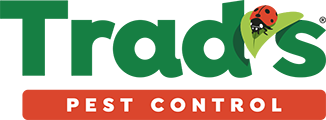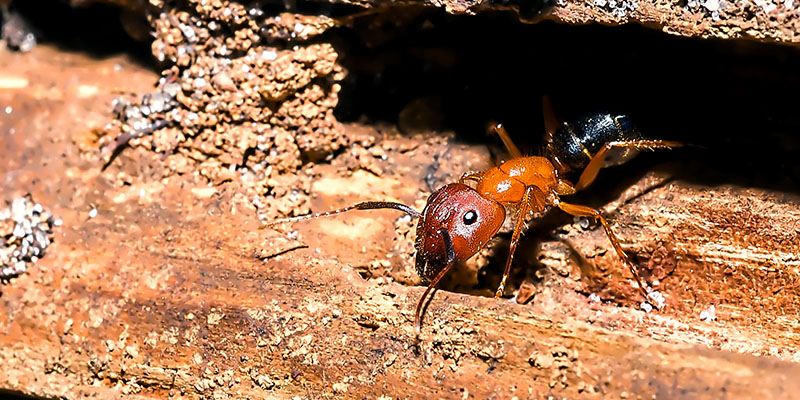Jacksonville, Florida, with its warm and humid climate, is a welcoming environment for various ant species. While these tiny insects might seem harmless, some can pose significant problems for homeowners. Because of this, let’s go ahead and delve into the Florida carpenter ant, fire ant, crazy ant, ghost ant, and pharaoh ant – ant species commonly found in the area – and provide insights into effective prevention methods to keep your home ant-free.
Ants are a common problem in Jacksonville, Florida. There are many different types of ants that can infest homes, but the most common are five species. While these pests aren’t as gross, or icky as cockroaches, or as alarming as termites, they aren’t any less innocuous. In fact, these tiny creatures can and do cause quite a few problems. Here’s a quick rundown of the carpenter ant, fire ant, crazy ant, ghost ant, and pharaoh ant…
Florida Carpenter Ant
Description: These ants are large, typically black or dark brown, and can grow up to 1/2 to 5/8 inches in length.
Behavior: Florida carpenter ants nest in wood, but they don’t eat it. Instead, they excavate galleries in decaying or moist wood.
Prevention: Address water leaks promptly to prevent moisture buildup in wood. Trim trees and shrubs away from your home to eliminate potential nesting sites. Remove decaying wood from your property.
Fire Ant
Description: Fire ants are reddish-brown ants that are about 1/8 to 1/4 inches long.
Behavior: These aggressive ants build large mounds in sunny areas and deliver painful stings when disturbed.
Prevention: Regularly inspect your yard for mounds and treat them promptly. Seal exterior cracks and crevices to prevent ant entry. Keep food and trash tightly sealed.
Crazy Ant
Description: Crazy ants are small, dark brown ants with erratic movements (hence the name).
Behavior: These ants are attracted to electrical equipment and can cause damage by short-circuiting electronics.
Prevention: Seal gaps around wires and cables entering your home. Eliminate standing water to discourage nesting. Trim vegetation away from your house to reduce access points.
Ghost Ant
Description: Ghost ants are extremely small, pale, and have a translucent appearance.
Behavior: They are known for their habit of suddenly appearing and disappearing, which gives them their name.
Prevention: Seal entry points and cracks around windows and doors. Keep kitchens and dining areas clean to remove food sources. Use ant baits in hard-to-reach areas.
Pharaoh Ant
Description: Pharaoh ants are tiny, light-yellow ants.
Behavior: These ants are notorious for being difficult to control due to their ability to establish multiple nests.
Prevention: Keep food stored in airtight containers. Seal all cracks and gaps in your home’s structure. Regularly clean up crumbs and spills.
Proper Pest Prevention
So, all of this really comes down to some basic facts. If you see ants in your home, it is important to take action quickly to prevent them from causing further damage. You can do this by sealing up any cracks or crevices around windows, doors, and the foundation. You should also keep food and water sources clean and sealed, and remove debris and clutter from around the home. If the infestation is severe, you may need to call a professional pest control company.
Damage Caused by Ants
Ants might seem like they can’t do any or much damage, but certain ant species can actually cause property damage to homes. Here are some ways ants can potentially damage your property:
- Structural damage. Some ant species, such as carpenter ants, are known for nesting in wood. While they don’t consume wood like termites do, carpenter ants excavate galleries in decaying or moist wood to create their nests. Over time, this activity can weaken the structural integrity of wooden components in your home, including beams, joists, and other support structures.
- Electrical damage. Certain ant species, like crazy ants, are attracted to electrical equipment. They may chew through insulation or wiring, leading to electrical shorts, malfunctions, and potential fire hazards. This can disrupt the functioning of electronic devices and appliances in your home.
- Contamination of food. Ants are naturally attracted to food sources. If they find their way into your kitchen or pantry, they can contaminate your food by crawling on surfaces and leaving behind bacteria and pathogens. This poses a health risk to you and your family.
- Garden and landscape damage. Some ant species, particularly fire ants, can damage plants and landscaping. They may construct their nests in garden beds, lawns, and around the base of trees, disrupting plant roots and potentially harming your outdoor aesthetic.
- Insulation damage. Ants can nest in insulation materials, including those used in attics and crawl spaces. They can damage or disturb insulation, reducing its effectiveness in regulating temperature and increasing your energy bills.
- Aesthetic issues. Ants can form visible trails along walls, floors, and countertops. These trails may include pheromones that attract more ants, making the infestation more visible and difficult to control. Additionally, the presence of ants in your home can be unsightly and unappealing.
- Weakening foundations. Large ant colonies, particularly those of certain invasive species, can excavate soil from beneath the foundation of your home. This can lead to uneven settling and potential structural problems.
It’s important to note that not all ant species cause property damage. For instance, ants like ghost ants are more of a nuisance due to their erratic movements and small size, but they generally don’t cause significant structural or material damage.
What Homeowners Should Do
To prevent ant-related property damage, it’s crucial to address any ant infestations promptly and take preventive measures such as sealing entry points, maintaining proper sanitation, and eliminating moisture sources. If you suspect an ant infestation that could potentially cause damage, it’s advisable to seek professional pest control services to assess the situation and provide appropriate solutions.
This is due to the fact that ants are persistent pests that can become a nuisance if not addressed promptly. Jacksonville homeowners are likely to encounter ant species such as Florida carpenter ants, fire ants, crazy ants, ghost ants, and pharaoh ants.
By understanding the behavior and habits of these ant species and implementing proactive prevention measures, you can greatly reduce the chances of an ant infestation in your home. Regular inspections, proper sanitation, sealing entry points, and seeking professional pest control assistance when necessary will help you maintain an ant-free living environment and enjoy the comfort of your home.

